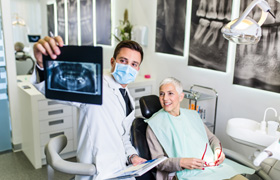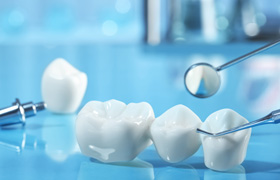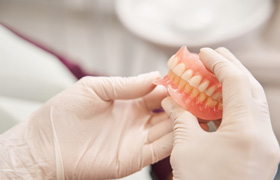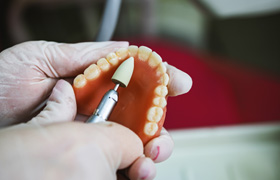Dentures – Milton, MA
No Need to Live Without Teeth
It may be hard to imagine losing all of your teeth, but it’s not as uncommon as you might want to think. Roughly 40 million Americans are missing both their upper and lower arches, and as a result they have to struggle with the cosmetic consequences and the inconvenience that comes with having no teeth to chew or smile with. Fortunately, our skilled dentists can replace all of your teeth at once with a centuries-old solution: dentures. If you or a loved one is facing a life with an empty grin, call us today to schedule a consultation to discuss replacing missing teeth with dentures in Milton, MA.
Why Choose Milton Hill Dental
for Dentures?
-
In-House Implant
Placement Available -
Morning and Evening
Appointment Times -
Skilled Dentists with
Years of Experience
What Are Dentures?

Today’s dentures are meant to look like real teeth to the point where the casual observer won’t be able to tell that they were missing at all. They’re made of ceramic teeth attached to a gum-colored ceramic base, and when designed correctly they’ll fit perfectly in your mouth. It’s important to remember that there are actually multiple kinds of dentures that you can get depending on your needs. The three types are as follows:
Full Dentures
A full denture is only recommended for the most extensive cases of tooth loss. You’ll receive them if you’ve lost all or most of the teeth in your top and/or bottom arch. Each full denture is designed based on a detailed impression of your mouth so that they can stay securely in place on your gums. The restorations themselves will be made at a dental lab by a team of experts. You can use denture adhesive to keep your new teeth in place, but if they have been fitted correctly, they should stay on your gums on their own thanks to the suction that is naturally created between the base and your gums.
Partial Dentures
Even if you still have most of your teeth, a few gaps can take a severe toll on your self-esteem as well as your diet. A partial denture has been customized to carefully fit into your mouth so that it fills in the various gaps throughout the arch. It will contain a number of carefully designed ceramic teeth that will blend in with the rest of your mouth. Clasps will be placed on your remaining natural teeth; they’ll be used to secure the partial denture in place.
Dental Implant-Retained Dentures
Both full dentures and partial dentures can be anchored to dental implants for additional security. Implants have superior longevity compared to other restorations, and they fuse with the jawbone itself so that they can take the place of your missing tooth roots. This promotes the growth of healthy bone tissue so that your jaw can continue supporting your teeth and your facial muscles, thus keeping your mouth healthy and your face looking more youthful as time goes on.
Who's a Good Candidate for Dentures?

Regardless of how many natural teeth you have remaining, potentially anyone who has suffered from tooth loss can benefit from having dentures. However, that doesn’t automatically make them the best solution for everyone’s unique circumstances.
Before you can proceed, you must consult one of our providers to ensure you’re a good candidate. Continue reading to learn more about who these restorations can help, and feel free to contact us for additional information!
Effects of Missing Teeth

Did you know gum disease is the number one leading cause of missing permanent teeth? If bacteria penetrate your gums and cause an infection, your connective tissues eventually pull away from your enamel to escape it. This leaves your roots without a firm enough foundation to anchor them, and they can become destabilized or dislodged altogether. However, cavities and physical trauma can also lead to tooth loss.
Gaps in your grin make basic tasks like eating, speaking clearly, and smiling confidently much more challenging. Also, your jawbone starts to thin without roots to stimulate new bone growth when you bite down, which can alter your facial structure.
What Qualifies You for Dentures?

Dentures are the tried-and-true solution for replacing lost teeth, but before you can be fitted with these prosthetics, our team must verify that you’re eligible. Some traits that we look for include:
- Healthy gums. Your restoration relies on a firm suction against your gums to remain put so you must have sufficiently strong connective tissues.
- Jawbone density. If your jaw becomes too flat, your bony ridges won’t protrude enough to give your prosthetics something to cling to.
- Severe tooth loss. This may be an ideal solution if you’ve lost most or all your teeth.
- Dentures cover your gums and the roof of your mouth to shield easily triggered or overly sensitive gums.
Alternative Tooth-Replacement Options

If our team finds that you’re not a good candidate for dentures, don’t lose hope! Sometimes, an additional bone graft procedure or other treatment may be necessary before you can proceed.
Otherwise, we’ll discuss alternative options for restoring your smile, such as:
- Dental bridges. These prosthetics can replace one or several missing teeth in a row and have a dental crown on each end to anchor to healthy teeth or implants on both sides of the space in your smile.
- Dental implants. This is the only method that involves surgically placing a titanium rod into your jawbone to function like a root and anchor an appropriate restoration to refurbish your grin.
Learn More About Dental Bridges
Learn More About Dental Implants
Benefits of Full and Partial Dentures

Full and partial dentures both offer a number of benefits. For starters, they’ll let you eat a wider variety of foods again. This means you can once again maintain a diet filled with crunchy vegetables and other nutritious foods. A complete set of teeth is vital for speaking clearly, and it’ll also improve your appearance so that you won’t have to feel self-conscious about an incomplete grin.
Benefits of Dental Implant-Retained Dentures

Dentures are viable on their own, but if you happen to be a candidate for dental implants, you can enjoy further advantages, including:
- Replacement tooth roots that feel natural once they join with your mouth.
- Less of a risk of your new teeth slipping or becoming ill-fitting after a few years.
- Easier maintenance since you can just brush and floss your teeth like you would normally.
- Improved jawbone health thanks to the stimulation that implants provide.
- A lack of sores from dentures that have not been properly fitted.
The longer you live with missing teeth, the worse the consequences will become. If you’re ready to replace your teeth, call us today for a consultation to ask about dentures and other types of tooth replacement.
How Dentures Are Made

Dentures that you see today aren’t like the ones that your grandparents used to wear back in the day. They are customized for each patient with the highest quality of materials available. To achieve a smile that matches you perfectly, getting dentures requires a multi-step process. Continue reading to learn more about dentures, what they are made off, and the process of making your new smile!
What Are Dentures Made Of?

Dentures are comprised of two parts: the base and the replacement teeth. Here is what each one looks like.
- Base: The base is the foundational structure of the replacement teeth. It can be made from various materials, but acrylic tends to be the most popular option because it looks so similar to the natural gum tissue.
- Teeth: Most of the time, the replacement teeth are attached to the base of the dentures and are made from either resin or porcelain. These materials look similar to real tooth enamel.
The Denture Creation Process

All dentures are customized, so everyone’s treatment plan looks a little bit different. Here is what making dentures typically looks like.
- Measurements are taken of the jaw, and impressions are made of the upper and lower gum tissue. These are used to create a plaster model of your mouth.
- The model is sent to the dental lab where your dentures are made. First, your replacement teeth are set in place with an articulator. Then, adjustments are made by a lab technician.
- The wax dentures are sent to your dentist for a sitting. If everything looks and feels great, they will be sent back to the lab so the process can be complete.
- After the dentures have returned to the lab, the wax needs to be replaced with acrylic. To do this, the lab technician places the dentures in a flask. Plaster is then poured into it to maintain the shape of the dentures. The whole flask is placed in hot water to melt away the wax.
- The plaster is cut from the dentures with dental tools. Then, the dentures are placed in an ultrasonic bath to wash away the remaining plaster.
- Any excess acrylic is cut from the dentures. Then they are polished to perfection.
- The dentures are returned to our practice. If you and your dentist are happy with the results, you will be free to show off your complete smile to the world!
Adjusting to Your New Dentures

When you first receive your prosthetic, you might notice some soreness. This is normal as your mouth adjusts to your new smile. Your dentures will start to feel more natural over time. When you first get dentures, it is ideal to stick to a soft diet and exercise your facial muscles. As you become more comfortable eating with your dentures, you can start to introduce tougher foods. If discomfort persists or you have any concerns, give us a call!
Dentures FAQs

There’s no need to live without teeth: at Milton Hill Dental, we’re proud to offer a variety of custom-made dentures in Milton. These classic and reliable restorations can help you regain the complete, confident smile you deserve! We understand that choosing the best way to replace your missing teeth is a big decision, and it’s likely that you have some questions that you’d like answered before committing to a treatment plan. While we’ll be happy to answer all your questions during your consultations, we’ve gathered some frequently asked questions about dentures below so you can learn more. As always, call us to learn more or to schedule your next appointment!
Should I Have All My Teeth Pulled to Get Dentures?
Repairing damaged teeth is always preferable to having them pulled and replaced. We only recommend tooth extractions when they’re absolutely necessary, such as if the tooth is irreparably damaged or severely infected. If possible, we will do our best to preserve your natural teeth with services like root canal therapy and crowns. However, sometimes if all the teeth in an arch are suffering from the effects of gum disease or decay, it may be more cost-effective to have them pulled than repaired. We’ll fully explain all your options before moving forward so you can make a well-informed decision about how to best proceed.
Can I Sleep with My Dentures?
When you first begin wearing your dentures, we will likely instruct you to wear them 24 hours a day for several days to a week in order to help your mouth adjust to them. After that, we’ll encourage you to only wear them when you’re awake and take them out every evening before bed. This serves two important purposes: firstly, soaking your dentures overnight is the best way to clean off any plaque or bacteria hidden in the nooks and crannies of your denture. Secondly, it takes pressure off your gums and gives them a chance to relax.
Is It Hard to Talk or Eat with Dentures?
Learning to navigate speaking and eating with your new dentures requires an adjustment period. At first, speaking clearly and eating may feel awkward or uncomfortable, but this should pass with time and practice. Consider chewing and speaking slowly, and use a small dab of denture adhesive to keep your dentures in place. Practice reading out loud to yourself and cut your food into smaller bites. It takes most patients about a month to adjust to their dentures.
What Should I Do If My Dentures Feel Loose?
Your dentures are carefully designed for a tight, snug fit to keep them in place. However, they’re not designed to last forever. If your denture begins to feel loose, it may be time to have it realigned or replaced. You should give us a call right away so we can see you promptly and readjust your smile. Wearing an ill-fitting denture can damage your gums, jaws, and remaining teeth, so don’t hesitate to call us if your denture feels loose!

